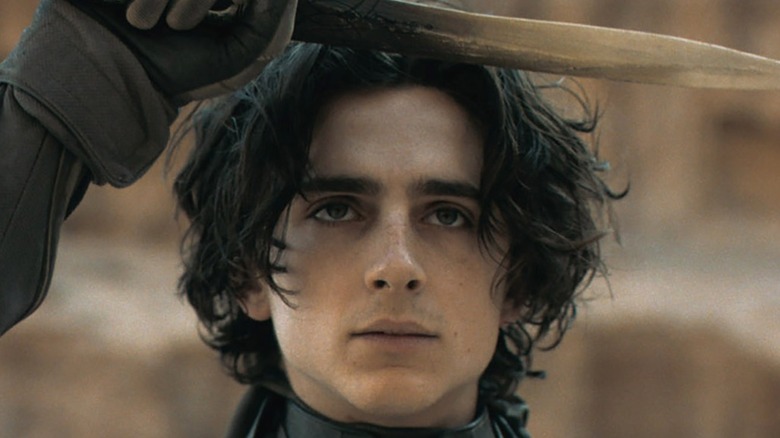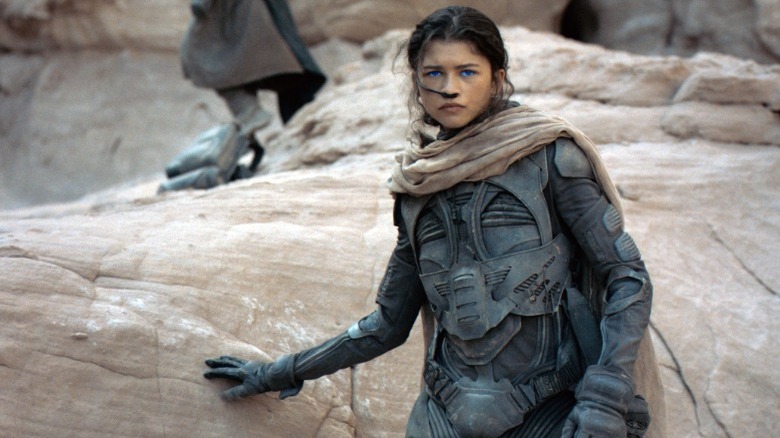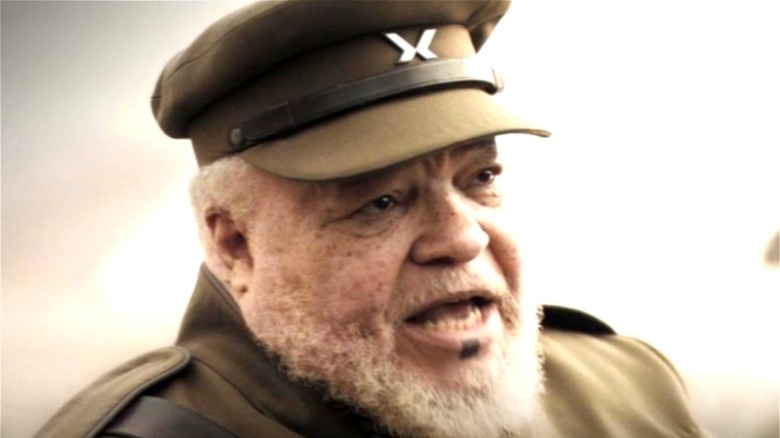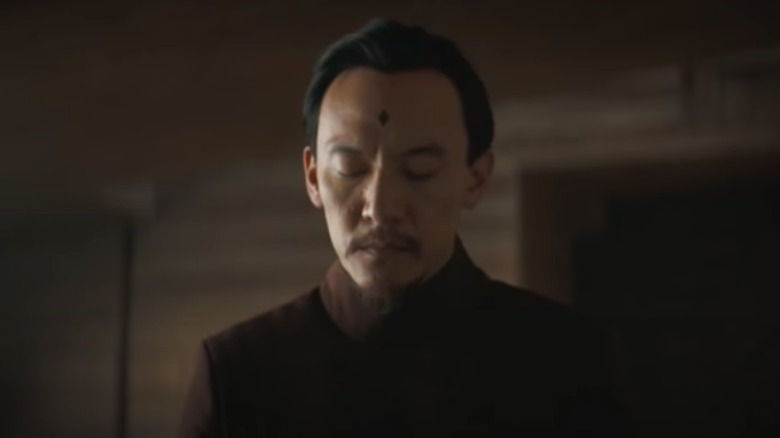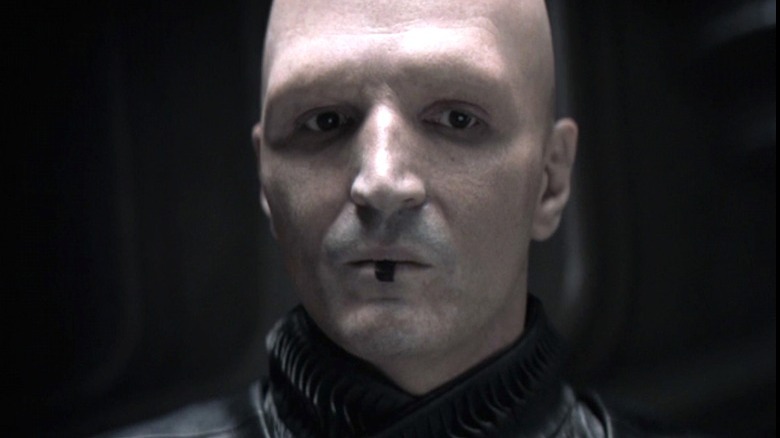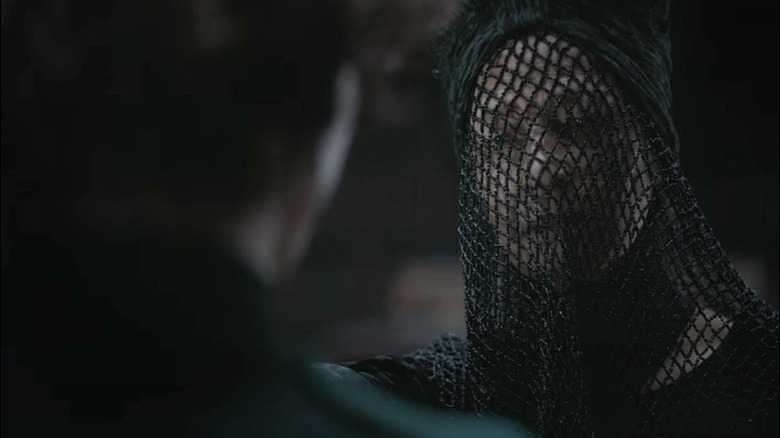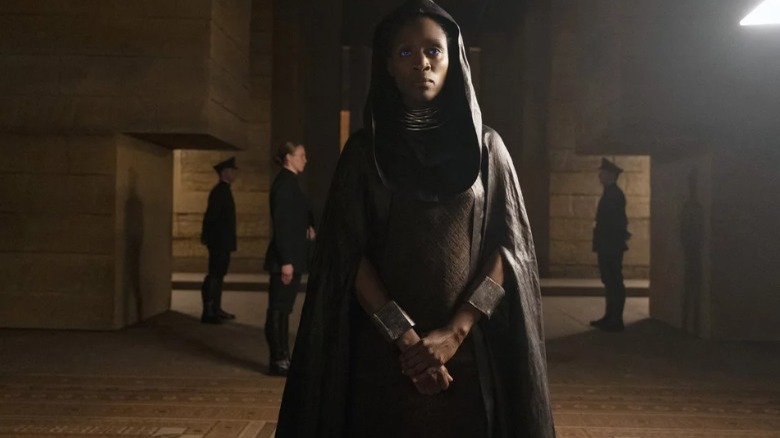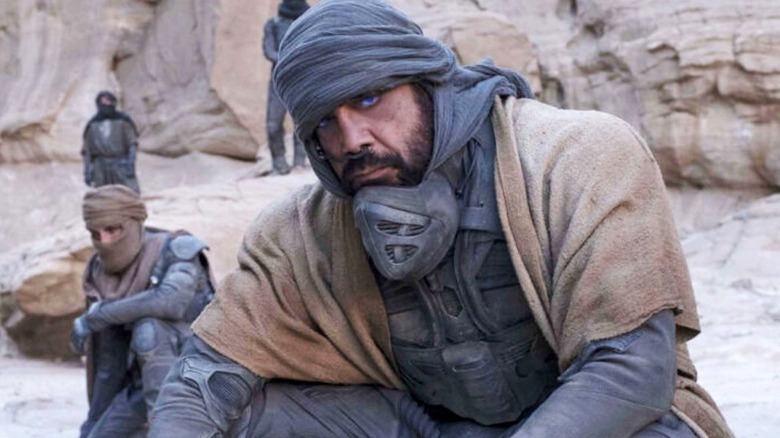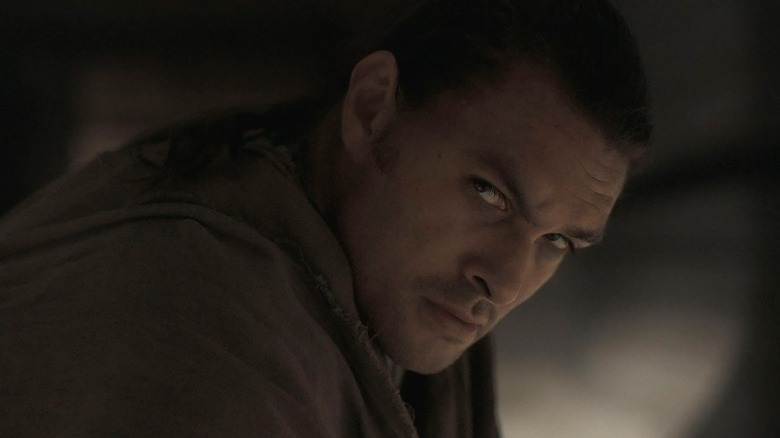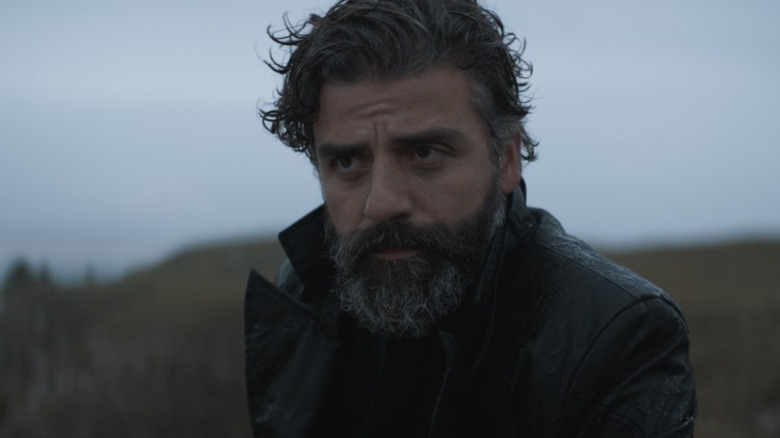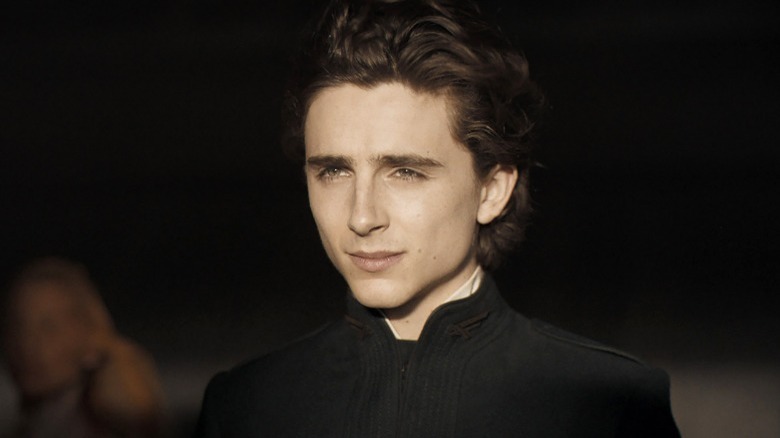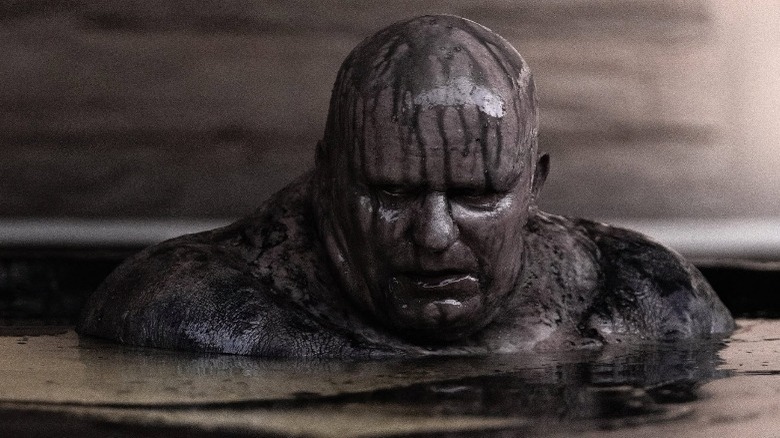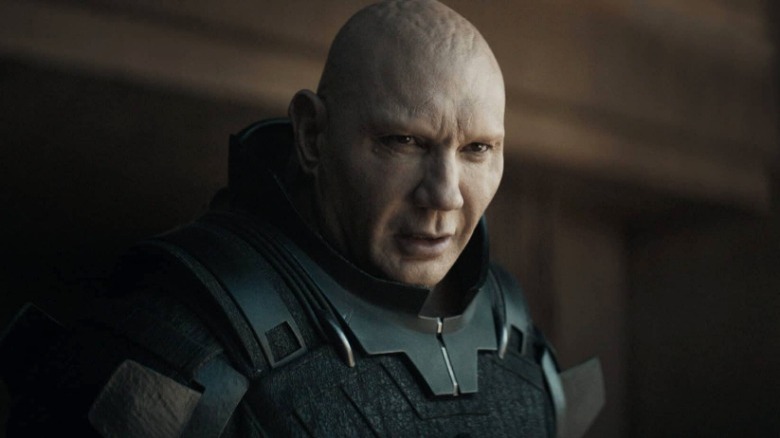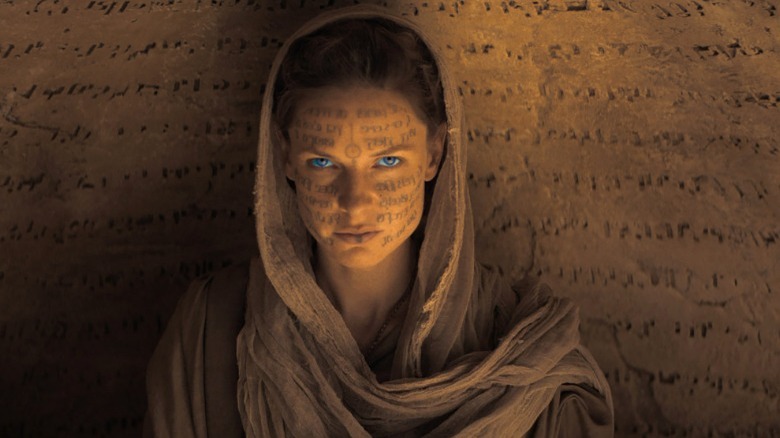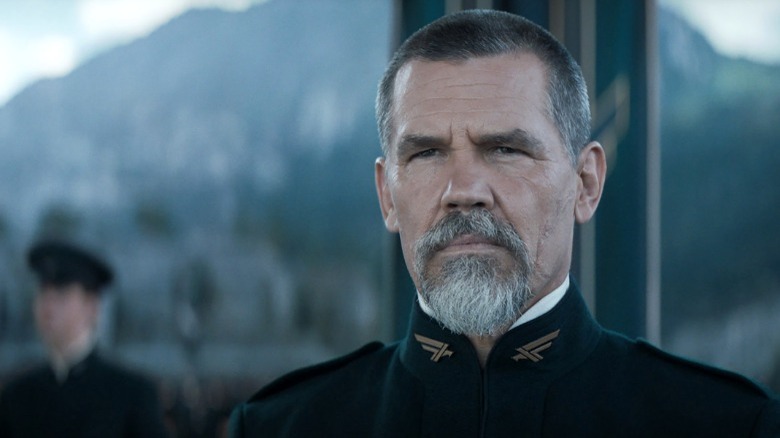The Best Characters In Dune Ranked
Denis Villeneuve's "Dune" is a triumph that's been decades in the making. Published in 1965 and long considered unfilmable by its many fans, Jodorowsky's unhinged, acid-fueled first attempt to create a movie landscape inspired by what he thought of the novel changed the future of science fiction at the cost of an unrealized film. Villeneuve's vision is the third complete attempt to interpret "Dune" for audiences (Part Two has just been confirmed), and the first to successfully trim it into something beautiful and awe-inspiring, with a sleek plot for new fans to ably follow.
With a cast of dozens to hundreds of characters, Villeneuve keeps the focus on a slight crew of fourteen main characters, sparing scant yet still memorable time for minor favorites like the Shadout Mapes. Using the novel and considering previous adaptations when useful, let's discuss and rank these fourteen main characters. They're the best, chosen for their humanity and cruciality to the plot. But not all of them had their potential realized.
14. Chani
The impact of Chani on Paul Atreides cannot be understated. The role of feminine power in "Dune" is something that's endlessly complex, from the Bene Gesserit, to the militant Fish Speakers to the later Honored Matres. Chani is a child of the sietch, a young Fremen who's not impressed by Paul's late arrival in her life. But for Paul, she's the guidepost, the mystical heart of his visions that guides him deeper into desert life.
Villaneuve's "Dune" currently covers only the first half of the novel, so it's unfair to compare Zendaya to other portrayals. Her performance as a dream half-realized is beautiful and terrifying, bearing both a smile and a bloody handprint. It also leaves Chani as a mostly unknown person. As important as she is to Paul, when "Dune" ends, she's still enigmatic. Half a story leaves her with a sliver of self, and we're left with only a glimpse of the confident, controlled warrior she's been up to now. Chani may be at the bottom of this list for now, but there's no doubt Part Two will change what we know, making her a force to be reckoned with.
13. Thufir Hawat
Book fans know a few things about the Atreides Mentat Thufir Hawat that we can't discuss yet. But we also know that the new film's Thufir, garrulous and cheery and bearing a vibrant parasol, is rudely severed from some crucial character development. He earns less screen time than Freddie Jones' 1984 interpretation, although the glimpse of how he uses his calculated Mentat abilities is appropriately unsettling. This Thufir, like the others, is also loyal to nearly a fault, holding every failure close to his soul.
As long as "Dune" is, a key subplot about Thufir's doubts and his mistrust of the Bene Gesserit Lady Jessica, is still unfortunately lost. It's understandable in context, but it also leaves Thufir without much to do. When the attack on House Arrakis begins, his role, and indeed, his very presence, fades into the background to be all but forgotten. It's a shame, because the few glimpses of him are lively and enjoyable.
12. Doctor Wellington Yueh
Thufir Hawat may have been short-shrifted, but Suk Doctor Yueh is the ironic victim of an amputation. The film successfully skips a plot dump about the Imperial Conditioning that makes a Suk Doctor trustworthy enough to become close to the rulers of the Great Houses, treating it as information a new audience doesn't need to enjoy his place in the story. But it does lessen the impact of why Yueh so easily turns on the Atriedes, and it leaves us without much of a reason to grieve his actions on the behalf of his wife, Wanna.
Chang Chen's performance is a good one, with his trustworthiness implied in his behavior. But without just a little more to make us care for him and about his betrayal, the fate of House Atreides loses some of its heartbreak. Atreides cared for its people, and its people cared for it back, unusual among the Great Houses. Yueh's downfall is small but titanic — and in Villeneuve's version, it's a whispery lament, lost among the clash.
11. Piter de Vries
Biases must be admitted to: David Dastmalchian is this writer's favorite newish actor, someone worth keeping an eye on since before his standout role in Villeneuve's harrowing "Prisoners." Giving him a chance to create something unique in contrast to Brad Dourif's delightfully manic interpretation of Piter was inspired casting, and Dastmalchian lives up to it. Here Piter's madness is barely restrained behind eerie body language, matching the 'effeminate' posturing described in Herbert's novel. His dialogue is measured but not quite sane. It's an excellent performance.
It's also about two minutes long. The sequence on Salusa Secundus is magnificent, and his attendance at the side of Baron Harkonnen ensures that Piter is memorable. But he's not given a greater chance to shine, and his tactical, crazed awareness that he serves a monster who will throw him away when he's no longer useful is lost entirely. Piter de Vries is wonderful. I just wish there was more of him.
10. Reverend Mother Gaius Helen Mohiam
Casting Charlotte Rampling is advisable wherever possible, and having her here uplifts the enigmatic and threatening role of the Bene Gesserit Reverend Mother Mohiam to the heights the book implied. The Bene Gesserit, as an organization, is made of both glove and fist. Lady Jessica is the former, and Mother Mohiam is our introduction to their fearsome power. She terrifies by implication. She's the first mortal threat to face Paul, she's part of the Emperor's personal coterie, and she is emotionlessly, fanatically dedicated to the Bene Gesserit cause. She is merciless, because she must be.
Without an introduction to the rest of the Emperor's court in part one of "Dune," however, those implications are all Mohiam can offer. It's brief but powerful stuff, less hissingly overdramatic than in 1984, and with a better costume than the Sci-Fi miniseries offered. Part Two can offer Mohiam more chances to make an impact, with the unintended results of their eugenics program horrifying even her.
9. Liet Kynes
Portrayed by Sharon Duncan-Brewster, Arrakis' chief planetologist and Judge of the Change became grander, colder, and more emotionally complex than Max von Sydow's enjoyable performance in Lynch's version. Kynes benefits from this new, potent performance, never needing to think audibly to herself how she likes the new Duke in charge of Arrakis. Her body language says it for us. Her hesitancy and her desire to believe are palpable when she sees how Paul has instinctively fitted his stillsuit. It gives her inability to change the fate of House Arrakis real weight. The disaster is beyond her to stop. All she can do now is trust to her beloved desert to do what it will.
Her fate in the movie is remarkable, if slightly altered from the book. The argument over whether or not the gone-native Kynes should have heard a Sardaukar approach is moot. The sight of her life's water spilling to the desert, and her defiant call to Shai-Hulud make it a dazzling, heart-wrenching sequence. This Liet Kynes showed the heart of Arrakis, and Arrakis has chosen to fight.
8. Stilgar
Javier Bardem offers a self-assured, casual take on Stilgar, the Naib (leader, from the Arabic word for 'deputy') of Sietch Tabr. Given militancy by a stoic Everett McGill in 1984, and unremarkable in the 2000 miniseries, our new Stilgar is a peak example of a Fremen warrior. The customs of the new House Atreides arrivals matter to him about as much as the Harkonnens did. That is to say, not at all. His approval is as subtle as the amusement he takes from Leto's initial confusion and insult to his water offering. The oaths Leto offers him mean little until they're actually acted on.
Like Kynes, Stilgar's behavior can be read as an avatar of Arrakis itself. Stilgar is the planet's ruthless efficiency. There's no cruelty in his initial decision to accept Paul and cast aside Jessica. It is simply what's necessary for the greater clan to survive. Respect is not easily earned from Stilgar, but when it is, it matters. More of Bardem's Stilgar is guaranteed in Part Two. That's great for fans of the novel.
7. Duncan Idaho
Others place Idaho higher in their esteem, and putting him in the seventh slot on this list is not a disagreement. Jason Momoa gives Idaho the feral, lusty, deeply confident air he had in the novels, something that Lynch's film very much lacked. It's a strong performance, the exact sort of physically alluring role Momoa was meant for. Lynch kills Idaho off earlier in the siege of the palace, where Villeneuve, rightly, gives us a longer glimpse of an Idaho who has privately made his final oaths to the security and the future of House Atreides.
The only reason Idaho is lower on this list is a hopeful optimism that's hard to explain without spoilers. For fans considering a dive into the books beyond the initial "Dune" novel, the impact of Idaho's ferocious loyalty to the Atreides and their Duke is crucial to "Dune Messiah" — which Villeneuve is also interested in adapting after the second part of "Dune" hits theaters in October 2023.
6. Duke Leto Atreides
"Star Wars" did Poe Dameron just a lil dirty by the time the sequels wrapped, but Oscar Isaac gets vastly better treatment in "Dune" as Leto, the Ducal Lord of House Atreides. Haunted by his own aborted desires, from a quieter life as a pilot to marrying the woman he loves, Leto's life shines through to the bitter end. He's forceful by necessity, but the greatest quality of Villeneuve's "Dune" is just how much humanity is granted to the doomed Duke.
Isaac's performance is majestic and never overdone. The subtle anguish in Leto's face when he's the Baron's captive is a Caravaggio painting given life. The hug he gives his son when they're in the heart of Caladan's royal cemetery is that of a loving father, not a lord. The loyalty he has from his subjects feels like it was earned from a countless stories we didn't get to see. That Isaac looks terrific in the clean lines of the Atreides uniform is a bonus. The whole package is a treat that blows previous performances out of the water.
5. Paul Atreides
"Dune" is about Paul's rise as a Mahdi, so how is Paul not number one? Because he's barely at the halfway mark of his journey and there's a lot left to come before we can judge the extent of him. As the film closes, he's taken his first step towards something larger than what he's known so far. Not maturity, that's already been forced on him. It's about individuality, attempting to find and keep something of himself despite the demands of both his bloodline and his prophesied fate.
Timothée Chalamet's performance is more dignified than Kyle MacLachlan's, and skips the immature anger that Alec Newman used in the 2000 miniseries to decent effect. His curiosity, fear, and regal restraint are remarkable, and it makes the impact of his later breakdown inside the tent he's sharing with Jessica all the more powerful. He's barely done being a child, forced to be a man, and it's not until the end of Part One that he understands exactly what it all means. That weight is visible on his face when he turns and looks down on his mother in the movie's final moments. What's to come will change the galaxy — but we're not privy to that yet.
4. Baron Vladimir Harkonnen
David Lynch's Baron was a floating grotesque, a campy villain that elicited cringing disgust instead of fear. Kenneth McMillian did a marvelous job within the context of the 1984 film. Stellan Skarsgård, however, understands and exhibits the subtler horrors that lie in the Harkonnen shadows. This Baron isn't a shouter. He doesn't show off his genetic monstrosities and his tortures for fun. They're his pleasures, even when they're so ascetic and bleak. There's no love in him, but an implicit, almost animal understanding of power. The unseen Emperor prefers this logical but broken monster in favor of a loyal, humane house. That tells us a lot about the galaxy beyond "Dune."
Baron Harkonnen thinks of himself as a kind of God, and his own flesh is just another tool to manipulate. The vastness of him is no longer a fat joke. He has nothing to prove to anyone, and he's so secure in himself that the horror of his massive countenance becomes another of his weapons. To see him is to shudder. If he will reshape himself so completely and without pause, what will he do to you?
3. Glossu Rabban, The Beast
Another bias alert, but this one is twofold. Dave Bautista is one of the most exciting character actors to get a leg up into the big leagues in decades, and his ability to go from cuddly to terrifying in a heartbeat speaks to the work he's done to get here. The book, meanwhile, makes Rabban almost enigmatic. He's The Beast in name and archetype, a dumb brute meant to cow a Harkonnen fiefdom into submission just by showing up with an armed force. But Frank Herbert gave him glimmers of cunning, the observable intelligence of a predator that knew his place, but could also suss out that the Fremen were a bigger problem than the Baron would believe.
That cunning seems to be lost in "Dune," which is a disappointment. But Bautista's simmering rage and loyalty to his violent cause is terrific to watch. His presence makes us forget that we were supposed to know what Feyd-Rautha looks like by now, and instead makes us afraid for the Fremen, whose competency shouldn't be in doubt. Rabban isn't just willing to go scorched earth on Arrakis; he's delighted to do so. In a saga about the meaning of humanity, Rabban shows just how far we can fall.
2. Lady Jessica
The movie leaves Jessica's role in House Atreides slightly obscure. The book clarifies that she's Leto's concubine, and that she defied her Bene Gesserit training by falling in love with her assigned mate. Both show that she's in trouble with her superiors for granting Leto the son he desired and not the daughter the Bene Gesserit wanted. Rebecca Ferguson gives Jessica a lithe mortality that wasn't used in Lynch's 1984 adaptation. The regal Francesca Annis was a good Jessica, but even she has nothing on Ferguson's roiling humanity.
Jessica's training and her love are in constant conflict during "Dune," making her key to Part One's emotional impact. The fleeting glimpse of her as Sietch Tabr's future mystic, a Fremen Revered Mother written into the holy word itself, is haunting in its portent. Yet she's also utterly believable as a mom who would do anything for her family. She's the key to understanding that no institution is infallible, that change will remain unpredictable despite the attempts to chain it to order. What she means for the future of the Bene Gesserit is left for Part Two. For now, she's the epitome of grace and power they thought they wanted.
1. Gurney Halleck
Gurney Halleck is Idaho's mirror — a crusty warrior and tactician who keeps the burning of his heart deeper inside his chest than his younger, virile counterpart. David Lynch gave the role to Patrick Stewart, decades before we came to love him as Captain Picard. It's a hard performance to live up to, in equal parts hammy and earnest. It wasn't hard to imagine Stewart as a kind of wry bard at the front of his war band. But Josh Brolin adds a hint of savagery that makes him all the more realistic, and his take on Halleck is a delightful surprise that uplifts the character into something special.
Brolin's Halleck is a sardonic cynic, the sort of haggard old warrior who can silence a rowdy bar with a look. But once he's a buddy, you'd trust him with your dog, your kid, and your planet. Literally anything priceless. It's clear that Duke Leto trusts him that much. Halleck has the control to train Paul in combat to his physical limits. Even in a seemingly pure fury, the goal is never to hurt the kid but to shape him. His signature baliset instrument is only glimpsed during the crossing to Arrakis, and we're denied of anything but a bit of chanted poetry. Halleck disappears during the siege of the palace, but the fact that he's my number one choice should leave new fans with hope for his fate.
